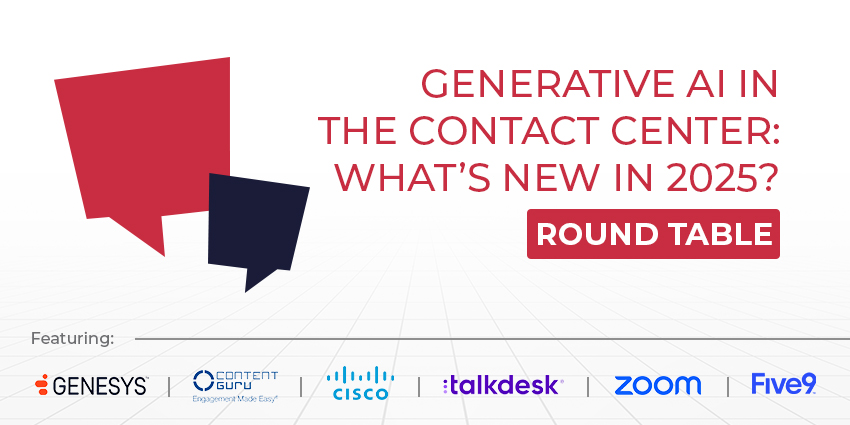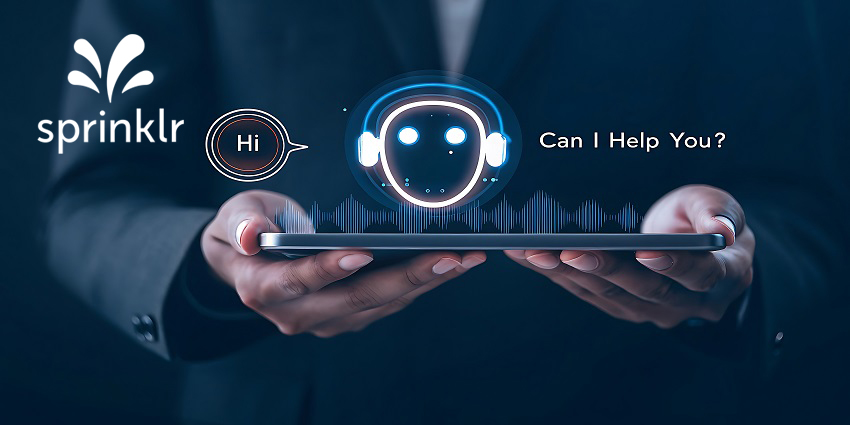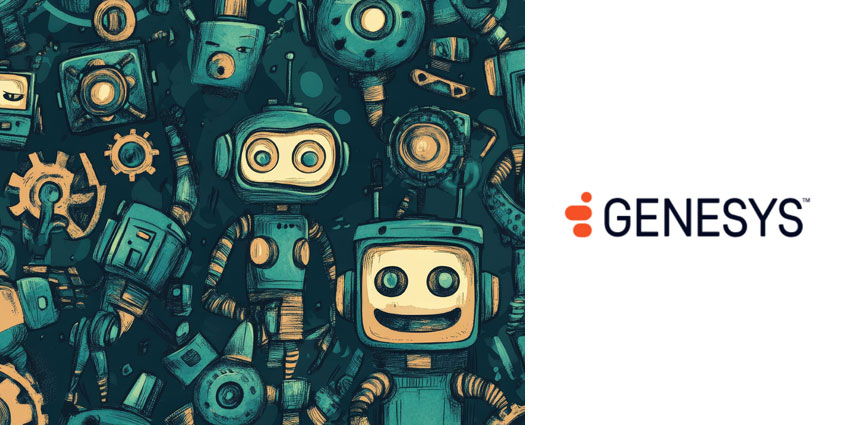Contact Center AI represents perhaps the most exciting opportunity for virtually any company focused on customer experience today. Companies have been looking for ways to transform their contact center into a more profitable, productive, and valuable resource for years.
Artificial Intelligence has proven to be a powerful component in this quest. With its ability to process vast volumes of data, automate tasks, and even proactively engage customers, AI empowers companies to live up to evolving CX expectations.
By 2027, the market for this technology is expected to reach $4.1 billion, and new opportunities are emerging constantly. In the last couple of years alone, new conversational AI tools, NLP solutions, and even generative AI apps in the contact center have exploded.
Today, we’re going to explain what contact center AI is and how it influences the CX landscape to help you prepare for the next generation of customer care.
What is Contact Center AI?
Most people are already familiar with “artificial intelligence,” the technology that allows computers to process information like the human brain. But how does computerized intelligence influence the contact center environment?
Contact center AI is a collection of tools and intelligent solutions designed to enable smarter, more data-driven, and more efficient customer interactions. It’s a broad concept that’s growing all the time. Initial examples of contact center AI began with innovative routing tools and IVR systems. These were intended to improve and streamline the customer journey.
Analytical tools in the contact center have also frequently leveraged AI to assist companies in processing and using vast amounts of contact data. These resources helped organizations to map and understand the customer journey and collect insights on market trends.
As natural language processing, machine learning, and conversational AI evolved, companies discovered new ways to embed AI into the contact center. We now use AI technologies to deliver self-service through intuitive, creative chatbots and virtual assistants.
Employees leverage generative AI to help them respond faster to customer queries and personalize the service experience. We’re even leveraging intelligent tools to assess customers’ sentiments and intent in various communication channels.
AI has emerged as a critical solution to modern contact centers’ challenges.
It automates repetitive work, streamlines communication, and helps businesses adapt to unpredictable call volumes. Some contact center platforms, such as Google’s Contact Center AI, are now built entirely on artificial intelligence.
What Can Contact Center AI Do?
Contact center AI’s potential use cases and opportunities have evolved drastically in recent years. Once, many business leaders saw AI simply as a solution for task automation. It’s becoming a core component of many strategies to improve employee and customer experience.
As we move into a new era of generative AI in the contact center, driven by rising hype around ChatGPT, the potential of intelligent technologies has become virtually limitless.
Some of the most common use cases for contact center AI today include:
Intelligent Interactive Voice Response (IVR)
In the past, IVR technologies were notoriously frustrating. They restricted customers to a simple menu of options and could not collect valuable information or perform crucial tasks. However, intelligent voice solutions built into IVR technologies are changing this.
Using natural language processing and understanding, companies can improve customer journeys from the first moment of contact. The right IVR solutions can collect customer data, identify intent, and even automate specific service tasks.
Intelligent Conversation Routing
Like IVR solutions, call routing technology hasn’t always been very efficient. Many tools simply passed customers to the first available agent without assessing specific needs or requirements. However, with contact center AI, companies can build more effective routing flows.
Intelligent systems can analyze customer intent and sentiment, gather information from customer profiles, and examine agent skill sets, to find the perfect match. They can also pass valuable information over to an agent automatically, speeding up the time to resolution.
Live Transcription and Translation
If there’s one thing contact center AI excels at, it’s collecting and processing information. Innovative tools with NLP technologies can rapidly accumulate and transcribe spoken words. This term unstructured data into searchable documents for auditing and training purposes. Generative AI tools can even use transcriptions to generate automated summaries after each call.
Some leading tools can rapidly translate speech into different languages in real-time. This helps agents to interact with consumers all over the world. It also reduces the need to outsource customer service to professionals from other countries.
Conversational Analytics
In a world where companies are becoming more attuned to the voice of the customer, AI in the contact center can be extremely valuable for collecting information. NLP tools can analyze conversations on any platform, surfacing information about intent and customer trends.
Conversational Analytics solutions can also offer valuable sentiment analysis insights. This gives agents real-time views into whether a call is going well based on tone and inflection. Some tools can even automatically notify a supervisor or manager when sentiment begins to drop. This allows leaders to jump in and guide a call before a customer churns.
CX Reporting and Business Insights
Contact center AI tools can process vast volumes of data in seconds. This allows contact center leaders to access more valuable insights into crucial metrics. An innovative tool can provide behind-the-scenes views on everything from agent performance to call volumes.
Pioneers like Dialpad are using contact center AI to enhance companies’ analysis of crucial metrics like CSAT. These tools use customer sentiment and extensive databases to give users a real-time view of satisfaction scores, without relying entirely on surveys.
Self Service Technology
Chatbots and virtual assistants are typical examples of contact center AI. They empower companies to offer customers new ways of accessing support and guidance without human input. Although human contact center agents are still necessary for some interactions, chatbots are becoming more effective. With generative AI, chatbots can offer a more “human” experience.
They can use data from CRM systems and other tools to personalize the customer experience and deliver custom recommendations. They can also automatically complete tasks, like checking a customer’s account balance or changing a password.
Quality Management and Coaching
Monitoring agent performance can be a labor-intensive and time-consuming job. It often relies on sampling data that quickly become out-of-date or irrelevant. Contact center AI can help to eliminate this problem. Intelligent tools can automatically track agent performance, script compliance, and metrics. It can also offer real-time insights into which team members need coaching.
Virtual assistants in the contact center can then deliver real-time guidance and coaching. They can use machine learning and historical data to determine the best ways to guide a call. These tools can even surface insights from a customer’s profile during a conversation to help agents personalize discussions and improve engagement.
Predictive AI
For years, analysts like Gartner have advised companies to take a more proactive approach to customer service and contact center management. However, a proactive strategy requires access to the correct data and tools. AI solutions empowered by machine learning can offer insights into predictive analytics, which help with multiple contact center strategies.
Based on their previous contact history, these contact center AI solutions can predict when a customer might need help or support in advance. When paired with workforce management tools, they can also be used for forecasting and scheduling strategies. This ensures companies can use their crucial resources more efficiently.
AI-Driven Automation
Many customer experience tasks require the input of a human agent. But many contact center jobs are mundane, repetitive, and easy to automate. Contact center AI can pave the way for the automation of tasks that consume agent time.
They can complete after-call work by transcribing conversations and uploading summaries to company databases. The same tools can also automate things like dialing numbers in an outbound contact center or sending follow-up messages to customers.
Security and Compliance
Customer data is valuable. Protecting that data is essential for business insights and ensuring compliance with evolving security and privacy standards. Managing data security in a growing contact center can be complex, but AI can help.
With AI tools, companies can improve security using biometric strategies like voice recognition to authenticate a caller. It’s also possible to monitor compliance and security standards more effectively in the contact center with AI. NLP tools can track words spoken in a conversation to ensure team members adhere to compliance policies.
The Benefits of Contact Center AI
With many potential use cases to explore, contact center AI is a significant value driver for today’s contact centers. Innovative AI solutions unlock many opportunities for companies to become more productive, customer-driven, and efficient.
Studies have shown that deploying automated AI solutions can increase CSAT scores, reduce abandoned calls, and improve customer retention.
AI allows companies to turn their contact center into a value driver, with advantages like:
- Enhanced customer relationships: AI offers access to self-service solutions and empowers agents to create more personalized interactions. This improves customer satisfaction scores, engagement, and lifetime value.
- Increased agent efficiency: Tools like generative AI and intelligent automation tools help agents to work more efficiently and productively. They can reduce average handling times, minimize repetitive tasks, and improve employee experiences.
- Reduced costs: Investing in AI allows companies to create 24/7 customer service experiences across all channels without paying endless employee salaries. It can also reduce operational costs by automating tasks usually performed by humans.
- Greater security: Intelligent, AI-powered fraud prevention and security tools can secure companies, protect valuable assets, and defend customers. This not only helps to improve compliance levels in the contact center but also enhances brand reputation.
- Improved insights: AI makes evaluating and using the vast volumes of data collected in the average contact center much easier. Companies can use their data to improve customer satisfaction scores and unlock new opportunities.
Will Contact Center AI Replace Contact Center Agents?
So, does the evolution of contact center AI mean tomorrow’s call centers will be entirely machine operated? Not necessarily.
Many use cases for contact center AI revolve around automation, reducing call volumes, and empowering self-service. However, they don’t eliminate the need for human input.
As more contact center vendors and innovators invest in AI tools, most are embracing the technology to augment and enhance human interactions. AI technology is intended to be a complementary tool for the human team.
It can help employees improve their productivity by generating rapid answers to questions or automating repetitive tasks. Contact center AI can also support agents in achieving their CX goals with step-by-step support and coaching.
While some tasks in the contact center may eventually be delegated to the machines, the agent will still play a role in essential customer interactions. Today’s customers are still looking for empathetic, human, and compassionate interactions with businesses.
Even in the age of generative AI, Gartner found only 8% of consumers used a chatbot during their previous service experience. This shows us that AI won’t eliminate the need for human agents. But it could allow tomorrow’s professionals to spend more time on valuable tasks.
While bots take over repetitive and mundane challenges, humans will still be vital in developing and nurturing strong customer relationships.
The Future of Contact Center AI
Contact center AI isn’t an entirely new concept. Contact center vendors have been building AI tools into their platforms for years. These solutions have helped companies with everything from data analysis to automating routing and note-taking tasks.
However, we are rapidly shifting towards a more AI-centric contact center. Natural Language Processing, conversational AI, and generative tools like ChatGPT are quickly transforming how we manage customer experiences. As innovations in this landscape continue to evolve, we’ll likely see more AI examples in every contact center environment.
Soon, AI will be more than just an add-on for the modern contact center. It’s set to transform the complete CX strategy of virtually every company.
The key to success in this evolving world will be learning how to leverage AI correctly. The right tools will augment and enhance the existing workforce. It will allow companies to improve customer experience and reduce operational costs without losing that crucial human edge.







